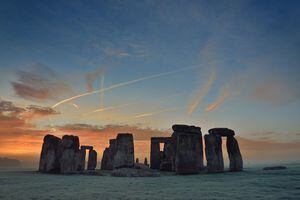Peter Rhodes on a shortage of soldiers, a new religion and what really went on at Stonehenge?
To look at the football coverage, you'd think Britain was stuffed full of eager young men draped in Union Jacks, declaring their love of England who are prepared to sacrifice their money, and possibly their health, to display their patriotism. Yet for the past few decades our armed forces have been chronically unable to recruit enough young people to fill their ranks. Curious.

In the Middle Ages when religion ruled our lives and we lived in dread of the afterlife, you wouldn't find many priests arguing that, yeah, Hell was pretty hot but think of the money you'd save on coal bills. Few monks or nuns would have suggested that, while being prodded with pitchforks by hobgoblins was painful, you'd never have to pay for acupuncture. The whole point of Hell was that it was the worst possible place to spend eternity, with absolutely no positives. Fast forward 500 years...
Today, climate change is the new religion. Its central belief is that we are heading for damnation but, if we just reduce our emissions and recycle enough plastic, we might somehow gain redemption. If we are bad we will perish. If we are good, we will live. Tinker with that basic message, suggest there are shades of grey or that climate change might even bring some benefits and you are a heretic. That's where the BBC found itself when the first draft of its Bitesize revision material for GCSE students asked the kids to explore opposing attitudes on climate change and listed a number of positives. These included longer growing seasons producing more crops, frozen regions such as Canada and Siberia being farmed and warmer temperatures leading to healthier outdoor lifestyles.
Within a matter of hours the offending section had been denounced and deleted by the Beeb “to be in line with the current curricula.” So that's a great victory for the priests, sorry, scientists. Meanwhile, you'll find a number of articles on the internet about the re-greening of Greenland where great crops of vegetables are made possible by global warming. All is not misery. (But you didn't hear this from me, right?)
Some years ago, building a brick pillar for a pergola, I accidentally dropped my hammer into the depths of the column and could not get it out. Five thousand years from now, archaeologists may discover that column and the missing hammer and announce that the ancient Hammer People took their hammers so seriously that they buried them in brick sarcophagi.
A few days ago, a new theory on Stonehenge was unveiled, suggesting that what we see today is merely the base of a vast roofed structure, a sort of stone-age Royal Albert Hall. It's an interesting idea but when you look hard at Stonehenge, doesn't it look more like a burial place for millions of sacred hammers? The trouble with archaeology is that we tend to see what we want to see.





